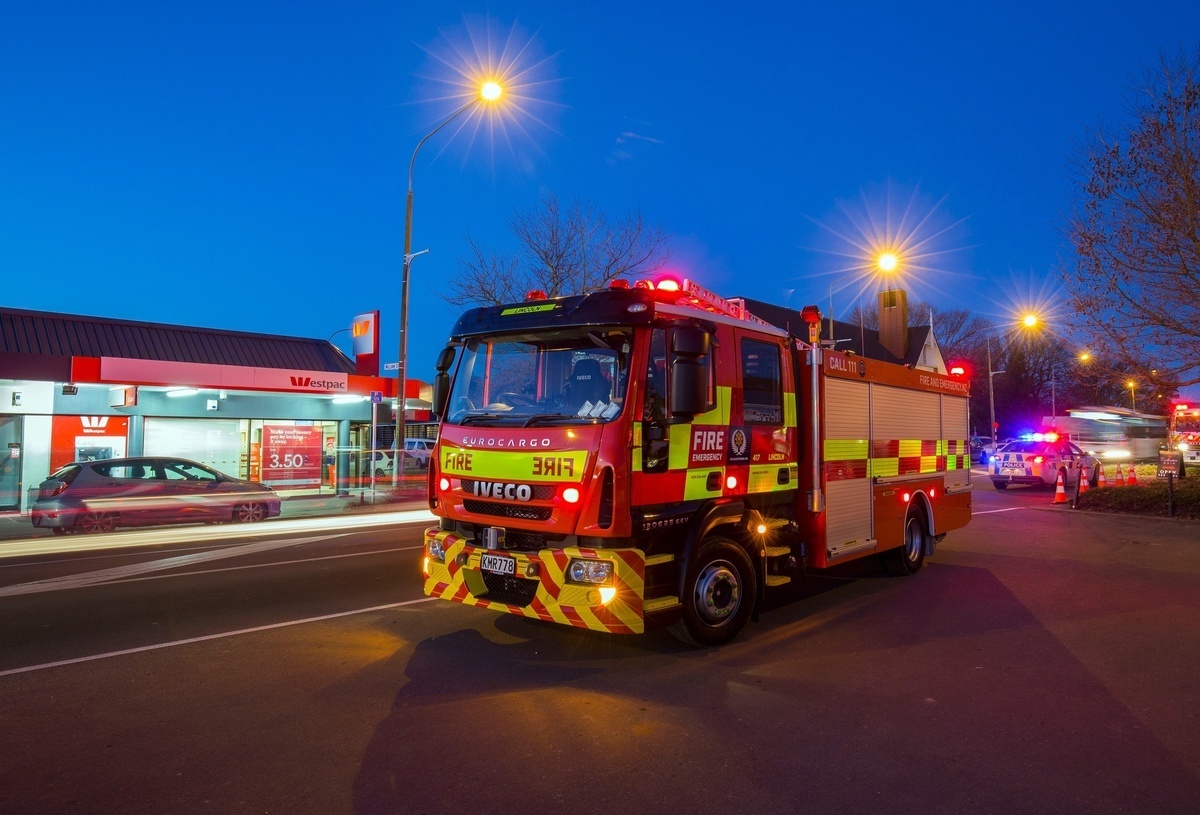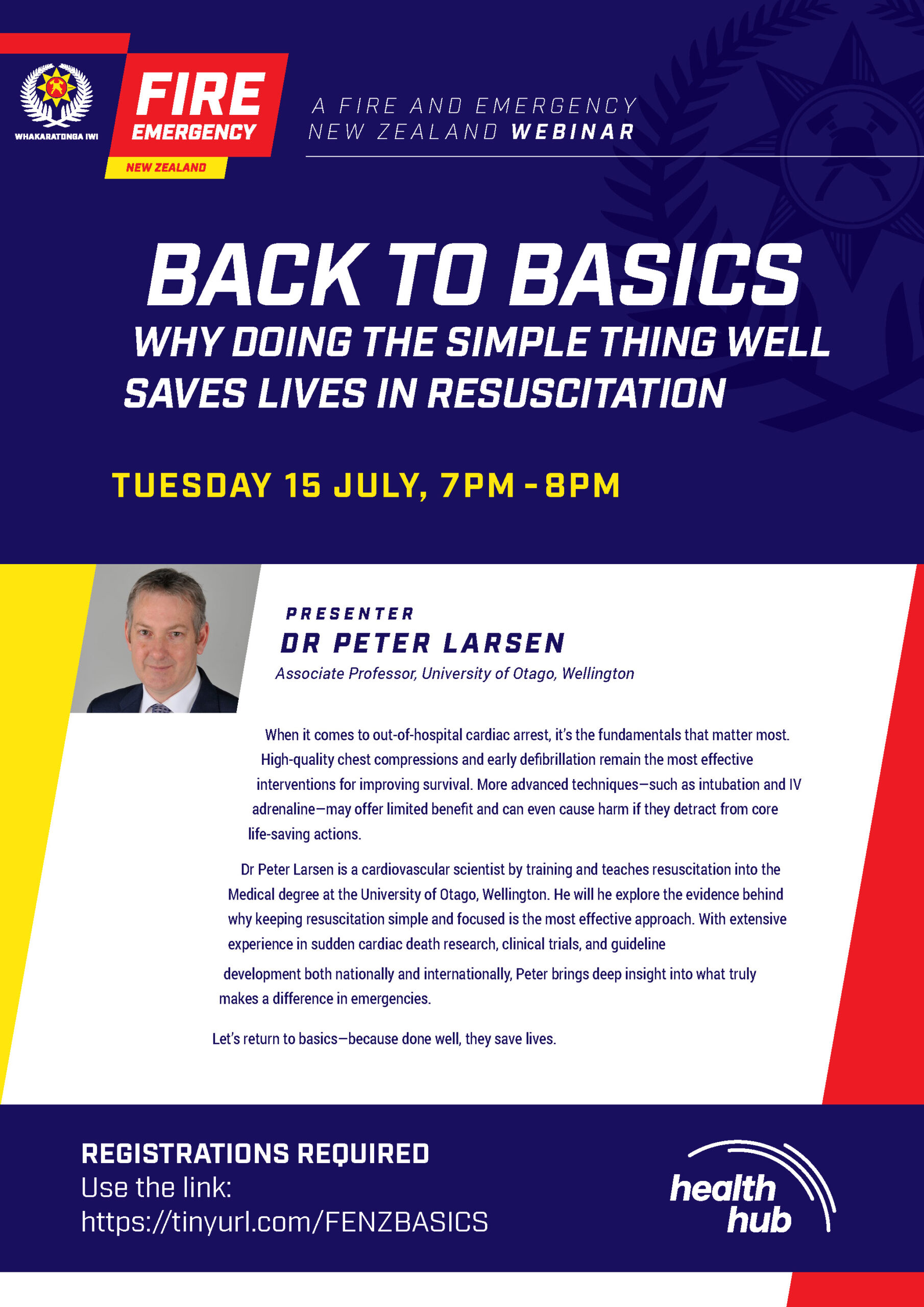Fire Emergency New Zealand
Welcome to the Fire and Emergency New Zealand partners webpage where we will be publicising upcoming webinars and uploading webinar recordings to view at your leisure.
We aim to provide a wide range of webinar topics, aligned with the feedback we receive either from you on our online survey at the end of each webinar, or back to your Senior Specialist, Medical Response for Fire and Emergency. Please keep us updated on topics of most interest to you!
We encourage you to explore the recordings of other webinar topics available on the My Health Hub webinars page, as many may also be relevant to your practice as a First Responder with Fire and Emergency.
Accessing and watching these webinars does not constitute a replacement for any prescribed education as required by our Ambulance partners to maintain our First Response capability, but is intended to supplement that learning for those that have an interest.

Webinars coming soon
COMING UP: BACK TO BASICS WHY DOING THE SIMPLE THING WELL SAVES LIVES IN RESUSCITATION
DATE: Tuesday 15 July
TIME: 7.00 – 8.00pm
Presented by: Dr Peter Larsen, Associate Professor, University of Otago, Wellington
Peter brings deep insight into what truly makes a difference in emergencies.
Let’s return to basics—because done well, they save lives.
Recorded Webinars
MANAGING THE COMBATIVE/AGITATED PATIENT
Held on: Monday 16 June
ROB KEATING, Critical Care Flight Paramedic, Greenlea Rescue Helicopter
In this webinar, Rob will share his insights on managing combative or agitated patients, including those affected by drugs or alcohol, experiencing mental health crises, or presenting with agitation during CPR.
MANUAL HANDLING IN MEDICAL
EMERGENCIES
Held on: Wednesday 7 May
KRIS GAGLIARDI, Critical Care Paramedic, Hato Hone St John
A practical and engaging session exploring key principles, including:
• Safe lifting techniques – and when not to lift
• Choosing the right approach for each patient scenario
• Essential terminology and clinical decision-making
• Communication and crew resource management (CRM)
• Environmental considerations and equipment selection
• Preserving patient comfort and dignity throughout the process.
CULTURAL SAFETY UNPACKED REFLECT, LEARN, ACT
Held on: Tuesday 1 April
MAARIE HUTANA, Nurse educator specialising in Māori health and health equity in clinical practice
A practical and engaging session that unpacks cultural safety, reflects on unconscious bias, and offers tools for creating respectful, inclusive, and responsive environments.
DE-ESCALATION
Held on: Monday 24 February
ELLE CRADWICK, Mental Health Educator
This presentation will include:
• How to recognise and de-escalate heightened behaviours, from agitation ramping up to aggression
• What responses are needed to de-escalate individuals at different points of the escalation cycle, including how to prevent people escalating to aggression and loss of control where possible
• About the stress response system and what this means both for the escalated person and ourselves.
MANAGING THE BREATHLESS PATIENT FOR FIRST RESPONDERS
Held on: Tuesday 26 November
NICOLA CORNA, Nurse Practitioner, Respiratory Services, Te Whatu Ora Counties Manukau
This session will include:
• Respiratory anatomy and pathophysiology of common respiratory conditions
• Aetiology, assessment and measurement of breathlessness
• Management of breathlessness including both pharmacological and non-pharmacological strategies
• Oxygen therapy – devices, assessment and management.
DIABETES EMERGENCIES
Held on: Tuesday 1 October
Lisa Sparks, Nurse Practitioner, Health New Zealand Te Whatu Ora Waitematā
This presentation will include:
• Brief overview of types and pathophys and progression of diabetes
• Overview of management for T1/T2 including brief review of insulin and non-insulin agents
• Mild – severe hypoglycaemia including hypoglycaemia unawareness
• Hyperglycaemia, DKA and HHS
• “Sick day rules” people with diabetes should know.
Emergency treatment of anaphylaxis for first responders
Held on: Wednesday 21st August
KRIS GAGLIARDI, Critical Care Paramedic, Hato Hone St John
In this session, Kris will provide an overview of allergies and anaphylaxis for first responders.
The session will focus on:
• What happens in the body during anaphylaxis
• The difference between allergy and anaphylaxis
• How to recognise anaphylaxis
• Emergency treatment of anaphylaxis, including intramuscular adrenaline
ASTHMA EMERGENCIES
Held on: Wednesday 10th July
KATIE FAAIUASO
RN, Nurse Educator, Asthma New Zealand
In this presentation Katie will discuss:
• What is asthma?
• Asthma signs and symptoms
• Common reliever medications
• Managing emergencies in the community
• How to administer reliever medications via spacer
• Oxygen and nebulisers
• Worsening asthma signs
Emergency treatment for drowning
Held on: Monday 20th May
KRIS GAGLIARDI, Critical Care Paramedic, Hato Hone St John
This presentation will include:
• Definition of drowning – what all the terms mean
• Basic pathophysiology – what happens to the body during drowning,
specifically the lungs and respiratory system
• Treatment priorities – standard resuscitation, with a focus
Haemorrhage Control: more than just stopping the bleed
Held on: Wednesday 20th March
ROB KEATING, Critical Care Flight Paramedic, Greenlea Rescue Helicopter
In this presentation Rob will explain the key principles of haemostasis – the stopping of life threatening bleeding. Further to this, the webinar will educate FENZ personnel on other aspects that are critical to saving a bleeding patient
New Zealand Ambulance Sector Clinical Procedures and Guidelines
Held on: Wednesday 7th February
Kris Gagliardi, Critical Care Paramedic, Hato Hone St John
This presentation will provide an overview of the emergency ambulance Clinical Procedures and Guidelines (CPGs), the First Responder Field Guide, and the new NZCPG app for FENZ. Information to assist FENZ personnel to quickly locate and navigate important clinical information and provide an overview of how to seek clinical advice and support in the field.
WHY AND HOW
Held on: Monday 20th November
LARA PETERS, RN, Clinical Team Manager, South Region, Hato Hone St John
Join Lara as she leads a discussion, delving into ‘why we do what we do and how we should do it’
- Why do Hato Hone St John ask you to gather information and assess patients in the way they do?
- The patient handover process
- Expectations – how to manage these on both sides.
PREPARING PATIENTS FOR AIR RETRIEVAL
Held on: Tue 24th October
TONI JOHNSTON, NP, Southern Critical Care – Dunedin Hospital, Paramedic – Order of St John Southern Region
In this webinar Toni will discuss:
- An overview of the considerations of the physiological impacts of moving patients by air (rotary & fixed wing)
- Patient categories and some of the patient-specific interventions
- Trauma Network & destination policies, why we don’t just go to the local hospital.
MANAGEMENT OF ACUTE STROKE
Held on: Mon 18th September
DR JULIA SLARK, PhD, RN; Head of School, Nursing Faculty of Medial and Health Sciences, University of Auckland
In this webinar Julia will discuss:
• Aetiology and presentation of sudden onset stroke
• Acute care interventions & management
• Immediate Complications
• Primary and secondary prevention
SEPSIS
Held on: Tue 27th June
CAMILLA HOWARD, Clinical Nurse Specialist – Sepsis
In this webinar Camilla will discuss:
• Sepsis – what is it really?
• Impact & burden of sepsis
• Pathophysiology of sepsis
• Recognition & action
• Post sepsis syndrome
BASIC LIFE SUPPORT & EMERGENCIES FOR INFANTS
Held on: Wed 24th May
NATALIE COWLEY, Nurse Educator, Children’s Emergency Department, Starship Child Health
The webinar topic will Include:
• Initial first aid
• Basic CPR and management of an airway
• Burns
• Seizure management
• Choking
• AED for infants
NATIONAL AMBULANCE AIR DESK AND ANTS CRITERIA
Held on: Tuesday 18th April
KATHRYN STEEL, Clinical Support Manager – Air desk
The webinar topic will Include:
• What is the National Ambulance Air Desk and how did we come into being?
• What is the role of the Air Desk?
• How do we make tasking decisions?
• What is the ANTS criteria?
AFTER THE CYCLONE
Held on: Tuesday 28th March
ELLE CRADWICK, Mental Health Educator, Big Chats Ltd.
What shapes can grief & loss take? What’s ‘normal’ after an emergency? What if the wheels are falling off? And is it OK if you’re doing OK right now?Learn about grief and loss, about how the brain responds after a significant event, what resources are available to help you navigate the impact of the cyclone or other events.
EARLY TRAUMA CARE – KEEPING IT SIMPLE
Held on: Wednesday 22nd March
MIKE HUNTER, Consultant Surgeon; Trauma Medical Director – Dunedin Hospital
Webinar topic included:
- What determines clinical priorities at the crash scene?
- What can anyone usefully do at the scene that alters the outcome?
- What are the key issues in communication?
- Common dilemmas that face us all
RESUSCITATION AND HIGH-PERFORMANCE CPR
Held on: Monday 14th November
Craig Jones, Critical Care Paramedic, St John
Webinar topic Included:
- When to use High performance CPR versus a standard approach
- How does CPR make blood go round and round
- The detrimental effects of pauses in CPR
- Latest research, and what to expect in the future
HELPING PEOPLE IN HIGH-STRESS SITUATIONS
Held on: Monday 10th October
Elle Cradwick – Mental Health Educator
Learn practical tips for helping distressed people on scene by understanding how the brain responds to traumatic stress.
Topic includes:
- How the brain reacts to stress and traumatic situations
- What you can do in the moment to help distressed people on-scene
- Ideas for what to do if things are sticking with you



